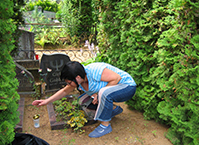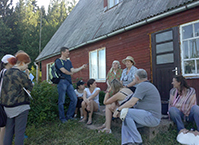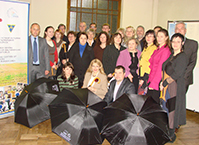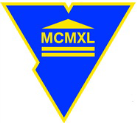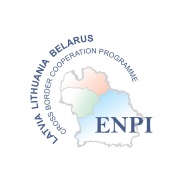Mikhail Pratsukevich: Pre-war economy
Categories: Family, Mikhail Pratsukevich
Mikhail Ivanavich, how did your family live in the Polish times?
Well, we sweated, worked all the time.
Who were your parents? Did they fall into the category of the wealthy, the middle or the poor?
Well, they were ordinary people. Well, they were the workpeople. We had a piece of land, well, we worked, and we bred animals, we did everything.
How much land did you have?
It was considered to be a valoka (transl. a unit of land measurement). And that’s all, well it was like that, there were hay makings at the moor. There was a moor there, well. Everything was included in. It was considered to be a valoka. And a valoka comprised about twenty three hectare. It seems like that.
And what about this land? Is it fertile or boggy?
Now, here? Well, what can I tell you? I can’t say it is boggy or... Something in the middle. The soіl is moderate. We seeded everything, seeded. This area was seeded too where you see millet is growing now, well, the people died there and the gardens ran wild, so they ploughed it and took in the harvest and, well, they seeded millet in these gardens. But they have already taken in the harvest. This summer.
And do you remember what did they seed at that time?
We seeded rye, barley, and also wheat and pea at that time. We had such crops!
And what...?
Flax.
Did you have flax?
Yes, we had flax, too. When being in Poland flax brought the best income. Well, it needs lots of efforts but brings good income. You see. Well, it was bought by the Jews in Dokshytsy. They bought it. I don’t know where they tokk it to sell but they paid a lot for flax. And you know what people wore in the Polish times, well, there were just few clothes to buy, everything was handmade. They stitched such, well, paddzyoukas (transl. peasant coats). We raised sheep. Then we sheared wool, span it, then weaved and stitched these, well, different clothes. That’s so.
What did you eat, what did you have on the dining table?
Well, we thought what to cook. So, cabbage was planted, we stewed cabbage. Well, we added some bacon for flavour. Just a little. This... this was our meal. Yeah, and potatoes, we made puree of potatoes, too. We called it porridge, potato porridge. We made this porridge this way. You see, that's how it was. And we used barley to make grits. Here then, in Dedino there was an estate, there in the corner. It belonged to Pan Slotvinski. Well, he had already built a mill and there was a krupyarnya (transl. grit mill) too. They made grits already at that time. So, this porrigde was from grits already. Puree. We called it porridge. Puree is how it is called now.
Please tell me what did you feed the cattle with?
With hay. When summer started we made hay. And what do you think we did at the moor? N-n-not big whee... impossible to reach, the soil sucked you down. So we carried hay, well, although we dropped some. And there we made, well, such a pathway, a higher platform not to let it get wet. We made a stack, we called it a stack. And only in winter when the soil is frozen we brought it out. You see.
Since when did you start to help your father about the household?
What can I tell you… Well, I was just attending school and I already hogged off. I hogged off, so, and you know the land was divided into three categories: this year they seeded rye here, barley, for example, next year they would seed something of spring crops in this place, and for the third year they didn’t seed anything here, they let the ground to rest. So, on this ground, it was called «papar», so I pastured the pigs on this «papar». You see. When I was seven years old, when I became older I pastured the cattle. I herded cows. I was seven, to a day I went to the pasture. I couldn’t say I didn’t want to pasture.
And what, what did your father tell you? You had to?
Yes, I had to do. I was his son. Well, they were rearing me, who would do this? Should he hire shepherds and pay them? He told I should herd them to the pasture and that’s that. Well. We had two horses. So, we had horses, you understand, we had a neighbor there. He is… now it is village Pervamaysk. You passed it on your way here, well, and saw this sign there at the p-pavement. So he went there... during the war, in the year of 41 the Germans already came here, so he went to his wife’s house there. And then the Germans or police pointed a gun at him and killed him. Actually, he had some relatives here, his brothers lived in this Kisyalyouka. So, this man was killed in Pervamaysk. Together we took the horses off for the night, so we used to take the horses off for the night, well, we herded them. There were already lots of wolves, now there is no cattle there that’s why there is no wolves. There used to be lots of wolves. When I went to school, well, it was autumn, the day was short, well, until the classes were over, there were four classes, and we had one teacher or sometimes two teachers. Just the same, well, it was dark to go home. And I had to go through the forest, so here you go straight and then through the forest. And my father had no time to meet me; he had to feed the cattle at that time, well. And he couldn’t come up to school, so I was weeping because I was so scared. But to tell the truth I was never met by the wolves. Oh, were you see. Anything can happen.


